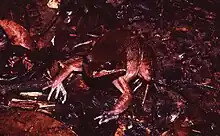Leptodactylus rhodomystax
Leptodactylus rhodomystax (common name: Loreto white-lipped frog, rose-lipped thin-toed frog) is a species of frog in the family Leptodactylidae.[3] It is found in the Guianas (French Guiana, Guyana, and Suriname) through northern and central Brazil to Amazonian Bolivia, Colombia, Peru, and Ecuador, and possibly in Venezuela where most if not all records represent misidentifications of Leptodactylus riveroi.[1][3]
| Leptodactylus rhodomystax | |
|---|---|
 | |
| Scientific classification | |
| Domain: | Eukaryota |
| Kingdom: | Animalia |
| Phylum: | Chordata |
| Class: | Amphibia |
| Order: | Anura |
| Family: | Leptodactylidae |
| Genus: | Leptodactylus |
| Species: | L. rhodomystax |
| Binomial name | |
| Leptodactylus rhodomystax | |
| Synonyms | |
|
Leptodactylus stictigularis Noble, 1923 | |
Leptodactylus rhodomystax are small frogs: the two syntypes measured 25 mm (0.98 in) in snout–vent length.[2]
Habitat
Leptodactylus rhodomystax in found in leaf-litter on forest floor and in swamps in tropical rainforest as well as on the edges of clearings and in more open areas in forest. It breeds in semi-permanent waterbodies.[1]
Reproduction
Leptodactylus rhodomystax is not very choosy about breeding sites and uses many types of temporary and semi-permanent pools.[4] Males call from within holes in the ground.[1] They seem not to form choruses, and usually only one or few males can be heard calling at a particular site.[4] Eggs are laid in foam nests.[1]
References
- Enrique La Marca, Claudia Azevedo-Ramos, Luis A. Coloma, Santiago Ron, Ronald Heyer (2010). "Leptodactylus rhodomystax". IUCN Red List of Threatened Species. 2010: e.T57160A11578109. doi:10.2305/IUCN.UK.2010-2.RLTS.T57160A11578109.en. Retrieved 14 November 2021.
{{cite journal}}: CS1 maint: multiple names: authors list (link) - Boulenger, G. A. (1884). "On a collection of frogs from Yurimaguas, Huallaga River, Northern Peru". Proceedings of the Zoological Society of London. 1883: 635–638. doi:10.1111/j.1469-7998.1883.tb06669.x.
- Frost, Darrel R. (2014). "Leptodactylus rhodomystax Boulenger, 1884". Amphibian Species of the World: an Online Reference. Version 6.0. American Museum of Natural History. Retrieved 12 May 2014.
- Zimmerman, Barbara L.; Bogart, James P. (1988). "Ecology and calls of four species of Amazonian forest frogs". Journal of Herpetology. 22 (1): 97–108. doi:10.2307/1564361. JSTOR 1564361.
